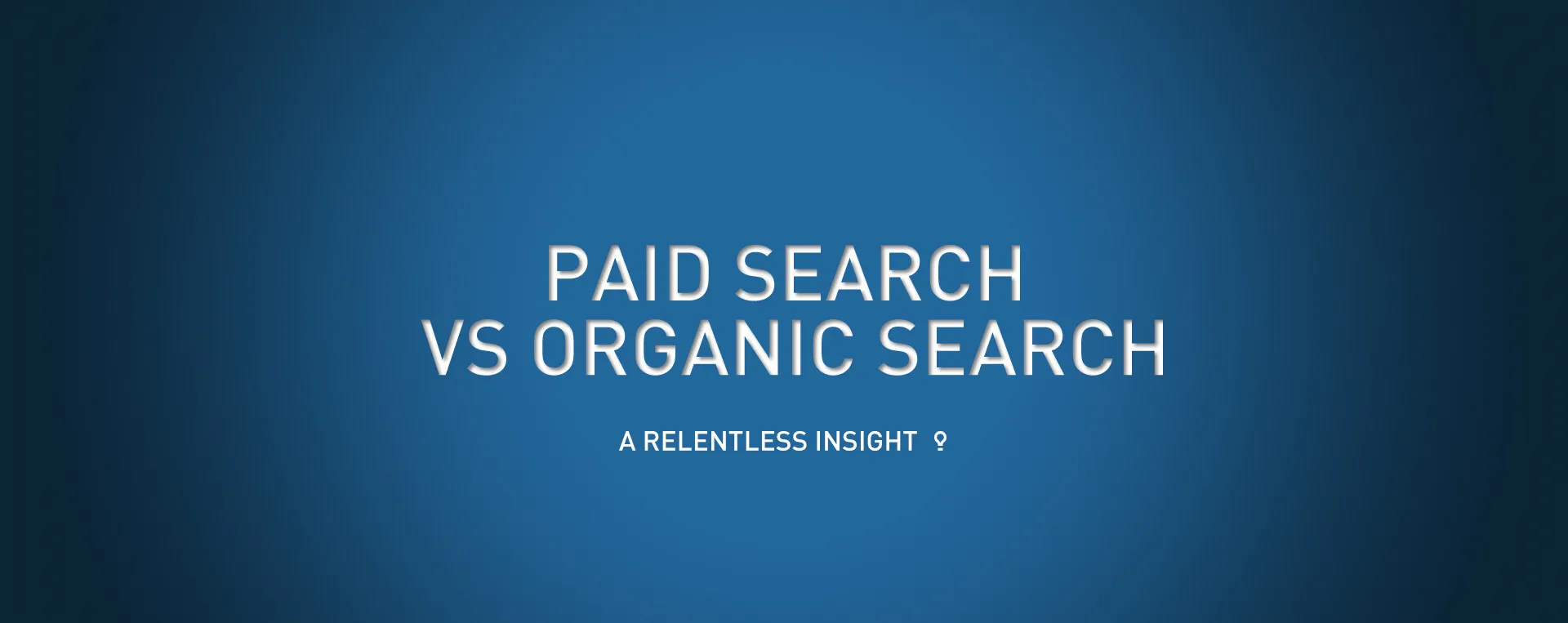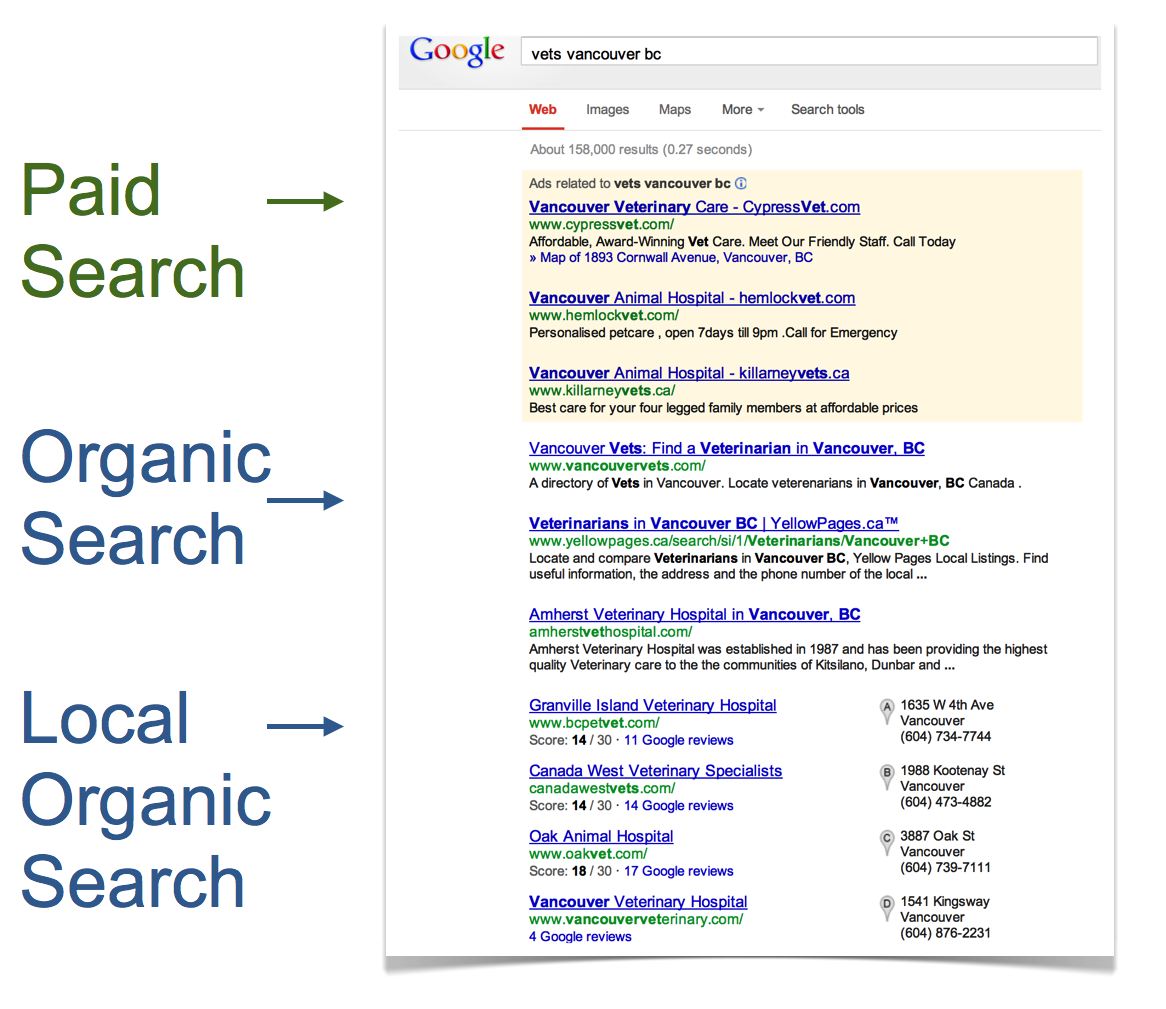Paid Search vs Organic Search
As search engine marketers, we sometimes find ourselves having to explain to our clients the difference between paid search and organic search marketing, and what the challenges and benefits are of both. At the same time, we also find that search engine users don’t understand the difference between paid and organic search. For the search engine user, it might not matter so much, as long as they are getting satisfactory answers to their queries. But to the business owner who is using search marketing to promote their business, paid and organic search strategies are dramatically different in terms of budgeting, function, and purpose.
Where Do Paid and Organic Search Results Get Displayed?
Paid search results are always labeled as such, but sometimes it can be tricky to find the label. The easiest way is to look for the shaded background that appears for paid results at the top of a search result page.
Organic results occur below paid results and do not have a background or ad label near them. Not all search queries will trigger paid ads, but generally any query will trigger organic results.
If a search query contains a local modifier to it, for example a city, then Google will often display a Google Maps local pack of businesses. These are also part of the organic search, but use slightly different variables for ranking factors. Having an up-to-date Google+ Local listing, complete with reviews is one way to compete in the local pack for a search query.
Paid search marketing is often called PPC, which stands for Pay Per Click. Organic search marketing is often labeled as SEO, which stands for Search Engine Optimization. The end goal of connecting a search query to an appropriate website result is the same: however, the techniques used to capture these types of visitors is different.
How does PPC work?
Adwords is a keyword based auction that happens within a search results page of Google anytime a user searches for a query to solve a specific problem or task. The results that are displayed to the user are based on auction rules designed to deliver the most relevant results from a pool of advertisers. The auction rules are based on keywords selected by the advertiser, the relevancy of those keywords to the advertisers website, the bid they are willing to pay per click, and most importantly the quality score of their keywords and ads. Because Adwords is based on quality score and relevancy, advertisers can’t buy their way to top unless their keywords and websites are serving users properly. Google monitors how their users interact with these ads and if they see that users aren’t clicking on your ads, they might assume that users don’t relate to your ad text, or the keyword isn’t relevant.
How does SEO work?
High rankings in Google are achieved by “making pages primarily for users, not search engines”. To do that Google suggests web owners “create a useful, information-rich website, and write pages that clearly and accurately describe your content”. By creating content in this way, your website is likely to garner links from other websites, which Google sees as a vote or endorsement of your content. The more links that a site can attain in this way, the more likely Google will reward your website with high rankings.
Both paid and organic search marketing are effective strategies to capture traffic for your website, but one strategy might work really well for certain circumstances, while the other might present challenges to generating traffic in the same situation.
To succeed in search marketing, either paid or organic, it is best if business owners are aware of the strengths and weaknesses of each so they can have realistic expectations and allocate resources appropriately.
When Should I Use SEO?
- When long-term results are desired.
- When you have patience to achieve results, not for quick or immediate results.
- When you have the willingness to commit time and resources to content creation.
- When you want to be an authority within your industry.
SEO strategies refer to search marketing techniques that can help your website appear in the search results often and in high rankings for relevant search queries. Search is one of the most popular ways for a website to generate traffic. Google processes over 400 million searches per day.
While search results do vary, the benefit of a solid organic search marketing campaign is sustained results. Once you achieve high rankings for high search volume keywords, you can expect to continually receive traffic for those keywords. However, in order to see these types of results, a considerable amount of time and resources needs to be put into developing unique content that is of value to users, and maintaining those positions by building more and more authority. It is only through valuable content will users likely decide to link to your website, and it is these links that count as votes for your website in rankings.
We often have clients request that they want to rank Page 1, Position 1 for a certain keyword that is related to their business, but the keyword is often far too general to realistically expect high rankings.
“You have to ask yourself, does my website deserve to be ranked at position one of a search results page?”
Keep in mind that many people tote SEO as “free traffic”. While it is true that sustained high rankings get more valuable over time, the incredible amount of time and resources it often takes to achieve these rankings is anything but “free”.
When Should I Use PPC?
- When you have a brand new site that is commercially focused.
- When immediate results are needed.
- When you need precise control over which keywords you want traffic for.
- When you need precise control over demographic targeting such as targeting by city, country, area code, mobile devices or interests.
- When your marketing efforts are time sensitive.
- When you want to dominate search results for your keyword category.
PPC marketing is a method of advertising on search engine results pages. You bid to have your ads appear in the sponsored results when someone types keywords into a search engine like Google. Each time a user searches using a keyword, advertisers who are bidding on that keyword get put in the auction and whoever has the highest Quality Score (essentially Google’s way of determining paid relevancy) will get top ranked paid results. Paid rankings are based on Quality Score, bids, and other factors such as geographical information to determine which advertisers participate in the auction. It is in this way that advertisers can’t just buy their way to the top. Their website has to be relevant and useful to Google users.
Paid search campaigns can’t be beat as far as immediacy. Your site can be receiving traffic within minutes of setting up a paid search campaign and having your campaign approved. Because of the speed at which you can achieve results, PPC is great for product launches, new websites and time sensitive campaigns. Have an event promotion that is only available to Vancouver residents for a specific date? No problem with PPC. You can create a campaign that is targeted specifically to Vancouver and will only run on those certain dates. This is the type of control that you do not have with organic search campaigns. There is no guarantee you will rank for your desired keywords in time for the event, and there is no way to only show those results to a specific geographical audience without PPC.
Many business owners dismiss paid results as something that “nobody clicks on” and backing that assertion up with, “I never click on ads”. Letting personal preference get in the way of data is not a good idea, especially in the age of trackable and accountable marketing campaigns such as search. The fact remains that Google generates $50 Billion in yearly revenue from users clicking on paid search results ads. Paid search results appear on top of organic results and in many industries as much as 50% of the search traffic goes to those top 3 sponsored links.
Depending on the marketing objectives, your business might have a preference for one or the other method. We find that the best strategy is a combination of both paid and organic search marketing, as the two working together can compliment each other; one making up for the other’s shortcomings.
Relentless is a certified Google Adwords Partner, having managed successful paid search marketing campaigns since 2000.
Posted on: 03/25/2013
Updated on: 11/27/2014
Posted by: Craig Hauptman – President & Founder
Related Insights:
Online Privacy & Cookies – Why Third-party Cookies are Being Phased Out
Google Search vs. Google Display – The Differences Between Google Search and Google Display Ads
Search Traffic: Paid vs. Organic – The Fundamental Differences and How to Leverage Each Type
Mobile Majority – Why a Mobile-First Approach is so Important
The AIDA Model – When to Use Specific Digital Ad Platforms Throughout the Sales Funnel
A/B Testing for Continual Improvements – Split Testing for Incremental Website Improvements
AI Chatbots & Search Engines – How AI Chatbots Will Impact Search Engines

















